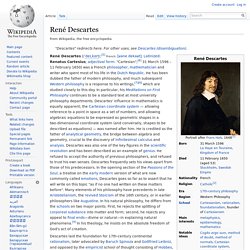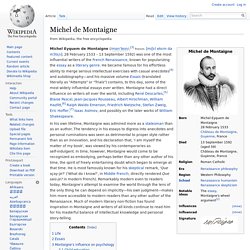

René Descartes. Descartes laid the foundation for 17th-century continental rationalism, later advocated by Baruch Spinoza and Gottfried Leibniz, and opposed by the empiricist school of thought consisting of Hobbes, Locke, Berkeley, and Hume.

Leibniz, Spinoza and Descartes were all well versed in mathematics as well as philosophy, and Descartes and Leibniz contributed greatly to science as well. His best known philosophical statement is "Cogito ergo sum" (French: Je pense, donc je suis; I think, therefore I am), found in part IV of Discourse on the Method (1637 – written in French but with inclusion of "Cogito ergo sum") and §7 of part I of Principles of Philosophy (1644 – written in Latin). Michel de Montaigne. Michel Eyquem de Montaigne (/mɒnˈteɪn/;[3] French: [miʃɛl ekɛm də mɔ̃tɛɲ]; 28 February 1533 – 13 September 1592) was one of the most influential writers of the French Renaissance, known for popularizing the essay as a literary genre.

He became famous for his effortless ability to merge serious intellectual exercises with casual anecdotes[4] and autobiography—and his massive volume Essais (translated literally as "Attempts" or "Trials") contains, to this day, some of the most widely influential essays ever written. Montaigne had a direct influence on writers all over the world, including René Descartes,[5] Blaise Pascal, Jean-Jacques Rousseau, Albert Hirschman, William Hazlitt,[6] Ralph Waldo Emerson, Friedrich Nietzsche, Stefan Zweig, Eric Hoffer,[7] Isaac Asimov, and possibly on the later works of William Shakespeare.
In his own lifetime, Montaigne was admired more as a statesman than as an author. Life[edit] Michel de Montaigne Quotes.